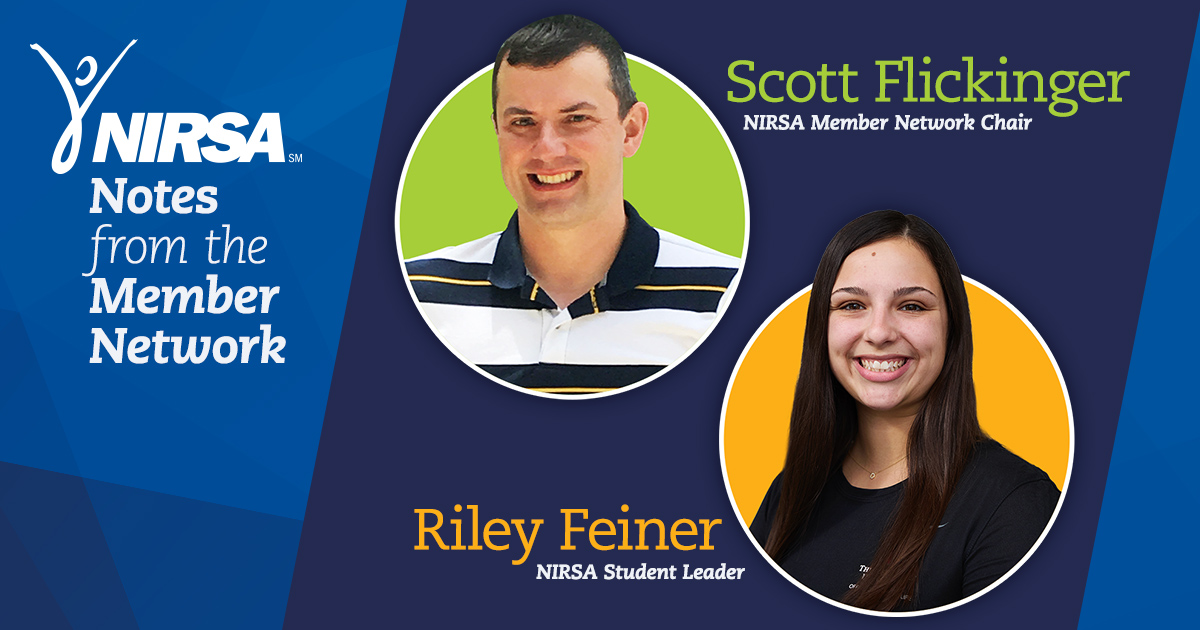By Kurt Klier, Assistant Director, University Recreation & Wellness, University of Maryland-College Park
Thirteen NIRSA members met in Corvallis, Oregon in 2006 to continue to work on what has become the NIRSA Championship Series as we know it today. If only I knew then what I know now. Recently, the NIRSA Championship Series has been challenged to explain why it decided to eliminate officials’ payment from the National Basketball Championships.
In a post on NIRSA Connect, I attempted to let the membership know the reasoning—something that should have been done months ago. I wanted the membership to understand two very important things. First, this was a hard decision. It was made after a tough discussion, but it was the right move for our long-term success and viability. Second, this is not to imply that we do not value our officials. We value them immensely. Factored into this decision is the high quality of the officials’ development product at the national tournament. If that quality were to decrease, I would be the first person to push for the Series to revisit the matter.
The budget for the Championship Series is a concern of the NIRSA Services Corporation Board of Directors and the NIRSA Championship Series Committee. It has been made clear that if the budget shortfall is not reduced, the programs we value could be impacted. We are always looking for different solutions. Institution registrations for basketball and flag football are one way we have been able to raise additional revenue. We are also working hard to secure major sponsorships. However, we could not wait for sponsorships to come to fruition this budget cycle. We had to make cuts and honestly this was, in my opinion, a bona fide option. We just did a poor job of communicating it.
The idea of not paying officials concerns some people and rightfully so. But, if we look at the product we provide at the National Basketball Tournament, I believe that perspective could shift slightly. At the National Basketball Tournament the whole system centers on the development of young officials. We use a rubric as a base for the evaluations. Part of the feedback is to use the rubric to represent graphically how well an official is doing and to show where improvement is needed. This more fully engages student officials in learning, not just being graded. We’ve also learned that the large majority of officials at the tournament received support from their institution for travel.
The diverse staff—including some of NIRSA’s finest officiating clinicians—who have experience in high school, NCAA Men’s, NCAA Women’s, and professional basketball are incredibly valuable resources for the officials. Ed Rush, former NBA Director of Officials, and Rob Rorke, Men’s Division 1 Official and Court Club, will help to evaluate our officials. And guest speakers at the tournament include JD Collins, NCAA Men’s National Coordinator; June Courteau, NCAA Women’s National Coordinator; and Tyler Ford, NBA and former NIRSA professional.
JB Caldwell, NBA recruiter; Jake Bell, SEC and Atlantic Sun Men’s; Diane Plas, several small college women’s conferences; Rob Doss, small college men’s supervisor; Beau Rugg, Ohio High School Athletic Association; and Lois Holmes, small college women’s supervisor, will all be in attendance as well.
Other great tournament features for the officials include:
- The opportunity to be seen by others who could help them advance; we have had a number of officials invited to development camps and development leagues because they were seen at the national tournament
- Evaluations for all games
- Videotaping on two courts and the opportunities to break down game tape with a camp clinician
- Complete teaching/learning environment
- A chance to earn donated scholarships for over 30 different officiating camps throughout the nation
The main objective for us is to provide a high level development experience for the student official. We ask the officials to “Commit to the entire experience – attend all meetings and work all game assignments, be actively involved in the learning process throughout. Come with the purpose to learn and improve your skills as an official.” That main objective has not changed.
I have obsessed with this decision. Did we do the right thing? Are we headed in the right direction? Thankfully I was reminded of a book by Deepak Chopra, The Book of Secrets: Unlocking the Hidden Dimensions of Your Life. In it he writes:
“If you obsess over whether you are making the right decision, you are basically assuming that the universe will reward you for one thing and punish you for another. The universe has no fixed agenda. Once you make any decision, it works around that decision. There is no right or wrong, only a series of possibilities that shift with each thought, feeling, and action that you experience.
If this sounds too mystical, refer again to the body. Every significant vital sign—body temperature, heart rate, oxygen consumption, hormone level, brain activity, and so on—alters the moment you decide to do anything…decisions are signals telling your body, mind, and environment to move in a certain direction.”
We have to move in this direction. All the signals are telling us we have to once and for all address the deficit that the basketball and flag football programs operate at. I used to sit on the outside complaining and arguing over the Championship Series—so much so that I had to get involved. I wanted to help and not be the guy who just complained. For so long I operated off the perception of what I believed to be true instead of what was actually true. I ask all members to “get the facts.” I and the entire NIRSA Championship Series Committee will be at the 2016 Annual Conference in Kissimmee, FL from April 3–6. If you have questions, please come talk to us. Let us share with you our perspective and how we plan to secure the future of the Championship Series.
Members are experiencing this in the present, but the leaders of the Championships Series have to make decisions that secure our future as our tournament continues to operate at a loss. And, if we want a future, we must be willing to move away from the usual way of doing things.





